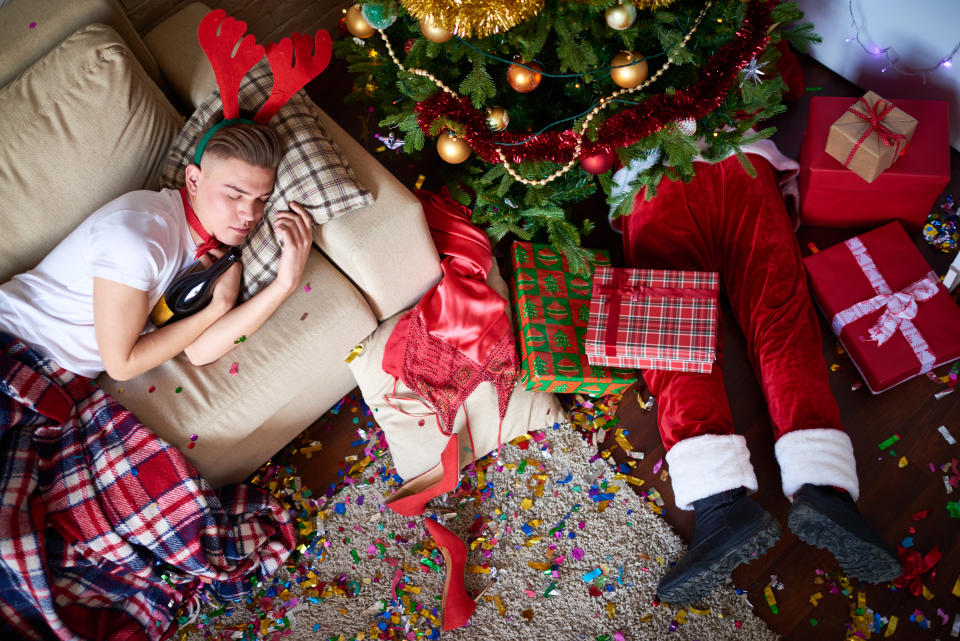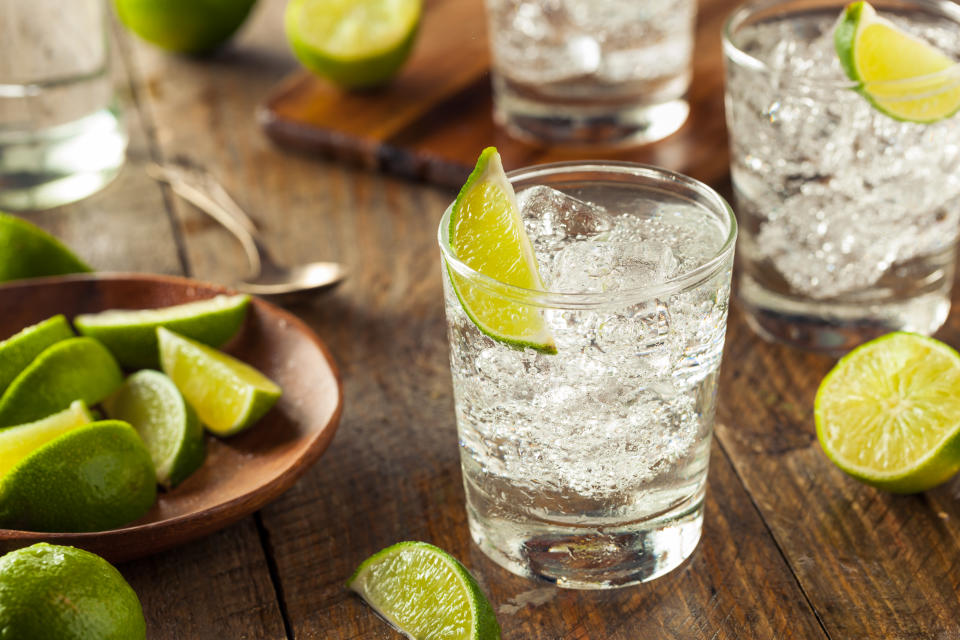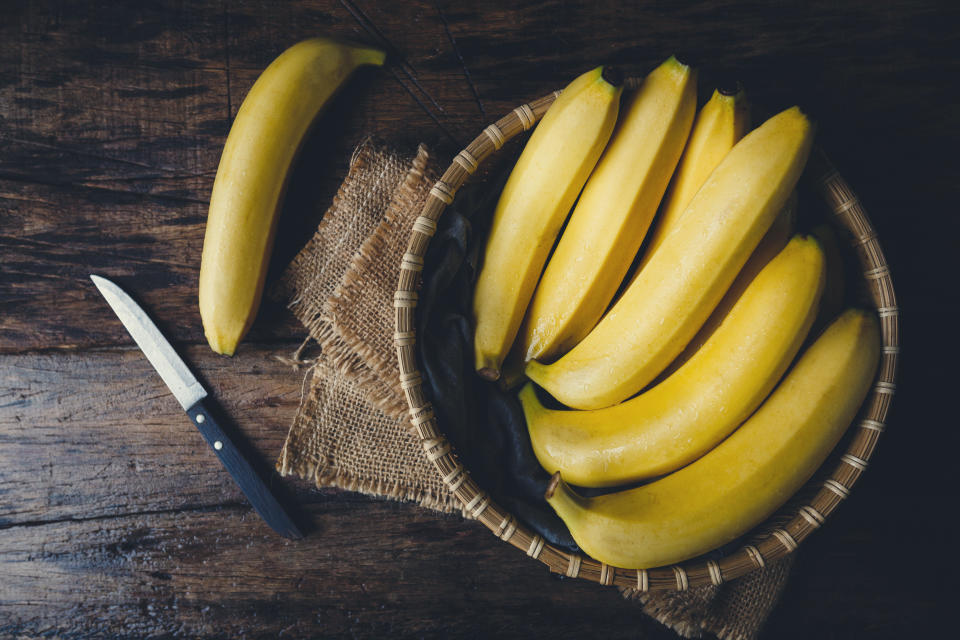Top tips to beat a festive hangover
![The risk of a festive hangover tends to increase in the run-up to Christmas [Image: Getty]](https://s.yimg.com/ny/api/res/1.2/acAfncOviZtsbFRMkjNFSA--/YXBwaWQ9aGlnaGxhbmRlcjt3PTEyNDI7aD02Nzc-/https://media-mbst-pub-ue1.s3.amazonaws.com/creatr-uploaded-images/2019-12/6ab0eb50-1b29-11ea-9ffb-bcb7a241a650)
The lead-up to Christmas may be a time to get merry - whether that’s at the office party, ‘friendsmas’ or with loved ones while exchanging presents.
However, the likelihood you’ll overindulge in the booze and wake up foggy-headed with a hangover is rather higher than usual, and it can risk impacting on the festive cheer by turning you into a Scrooge pretty fast.
Fortunately, there are ways to ward off its worst symptoms in advance, and ease the pain the morning after the night before.
Firstly, it’s worth noting what’s happening to your body on a hangover.
That cocktail may feel like it’s washing down well, but the alcohol is acting as a diuretic - meaning it removes fluids from the body.
It’s the consequent dehydration, and presence of toxins in your body, which causes everything from a piercing headache and an irritable stomach, to fatigue, brain fog and ‘hangiexty’.
However, it’s not simply a matter of rehydrating with water - scientists also know that the body won’t feel good until the liver has finished converting a toxic chemical compound called acetaldehyde into another toxin called acetate.
Aside from drinking less - or not at all - here are some science-lead tips and tricks for avoiding a festive season-induced ‘duvet day’...

How to prevent a hangover
Eat before you party
Sounds obvious but, it’s always worth repeating this one. The NHS in the UK recommends you don’t drink on an empty stomach.
The health organisation suggests enjoying a dinner that includes carbohydrates - like rice or pasta - or fats, to slow down the body’s absorption of alcohol.
Start off on the bubbly
If you want to get in the party mood while drinking less, opt for a chilled glass of champagne or prosecco. When cold, scientists have found that the carbon dioxide bubbles in the drink escape more slowly, meaning alcohol passes into your bloodstream more quickly.
The consequent buzz - said to have a faster effect than a shot - could really encourage you to just leave it at one.
Choose a G&T
There is some evidence that choosing drinks, like gin and vodka, with lower cogener levels - biological compounds made during the alcohol fermentation process - and higher pure ethanol content may be less likely to cause a hangover than dark-coloured drinks with higher cogener content, like bourbon and red wine. That’s because they irritate the blood vessels and tissue in the brain.
However, while participants in studies reported greater hangover intensity with the latter type of booze, all forms affected general next-day concentration and performance in tasks like reading and driving.

Avoid cigarettes
While being a few beverages down may make lighting up all the more tempting - you’ll feel far worse the next day if you succumb.
A study looking at the alcohol intake of 113 university students discovered that smoking significantly increased the risk and severity of their hangovers compared to when they just consumed alcohol.
Use a sleeping mask
Not getting quality shut-eye can heighten your risk of a sore head the next day.
You need to prep your bedroom so that nothing will wake you up early - this is particularly important since research has shown alcohol disrupts the restorative functions of sleep, which won’t help your body deal with all the toxins it needs to process.
Invest in a good sleeping mask, black-out blinds or curtains, ear plugs and have a glass of water ready on your bed-side table for when you wake up with that pesky dry mouth.
How to cure a hangover
Pop supplements
If you’ve awoken feeling less than amazing, your first step - as well as slowly sipping H20 so it doesn’t irritate your stomach - should be to replenish the vitamins and minerals you have lost from drinking.
The most crucial are vitamins B and C. Taking a vitamin B complex - which usually includes B1, B2, B6 and B12 - has been found to help those nursing hangovers.
Consuming a Berocca - or similar - has also been shown to help fight hangover-induced fatigue since it contains B vitamins and a high dose of vitamin C.
Eat something
You may feel nauseous, but getting something down you - if you can - will make you feel much better.
Order a dish containing eggs. They contain a compound called cysteine, which works to tackle a headache-causing toxin that's produced when your body digests alcohol.
According to Drink Aware, bananas and kiwis can also help - they are a source of potassium, a mineral you lose when you drink.

Avoid a ‘healthy’ cuppa
A Chinese study found that herbal teas make your body process alcohol more slowly - so you’ll feel worse for longer.
The same researchers discovered that sipping on a Chinese version of Sprite and regular soda water help speed up the body's alcohol metabolism.
Take painkillers
If you’ve got an important day ahead where you can’t stay in bed, popping ibuprofen or paracetamol will be able to mask a headache or muscle cramps and get you through.
Remember, the usual dose for adults is one or two 500mg tablets up to four times in 24 hours, and you should always leave at least four hours between dose.
Try an antacid
Tummy yet to settle? It’s recommended taking an antacid to help it calm down.
It works by neutralising the stomach acid, and can also reduce nausea, heartburn and indigestion caused by booze.

 Yahoo Lifestyle
Yahoo Lifestyle 


